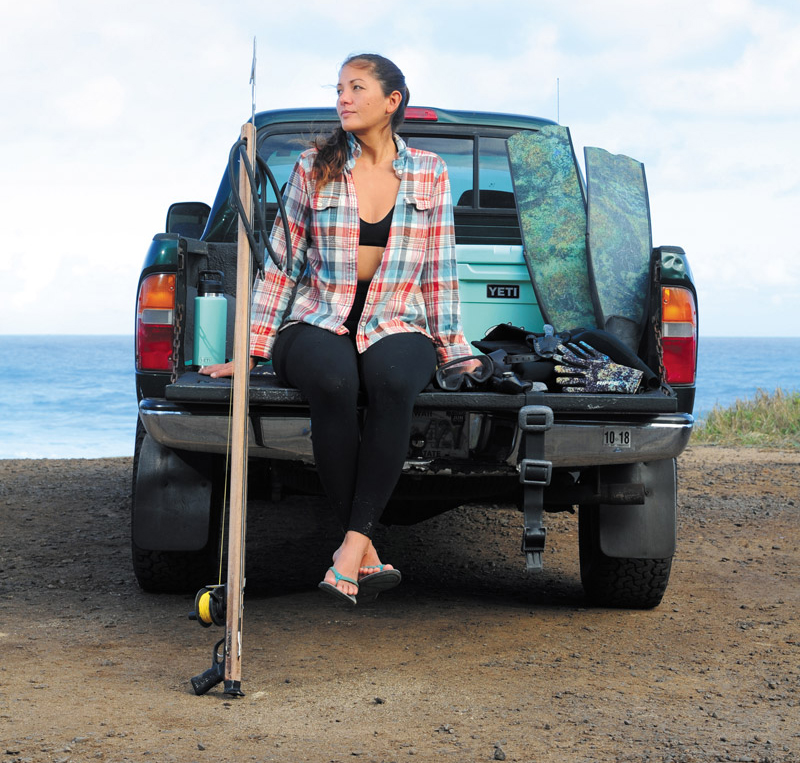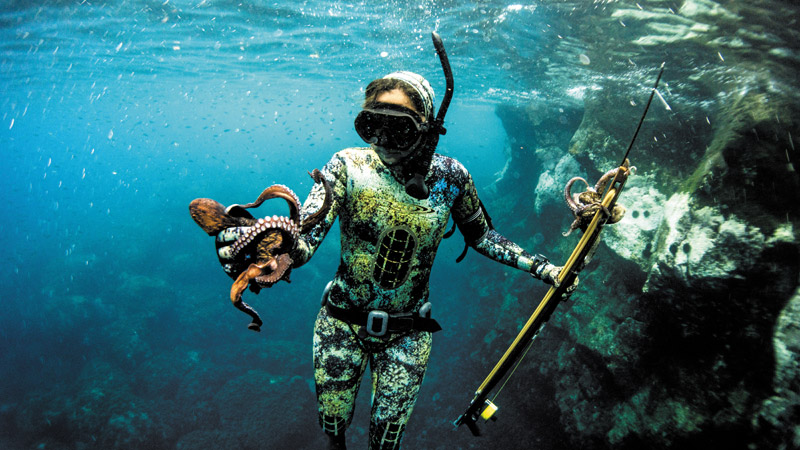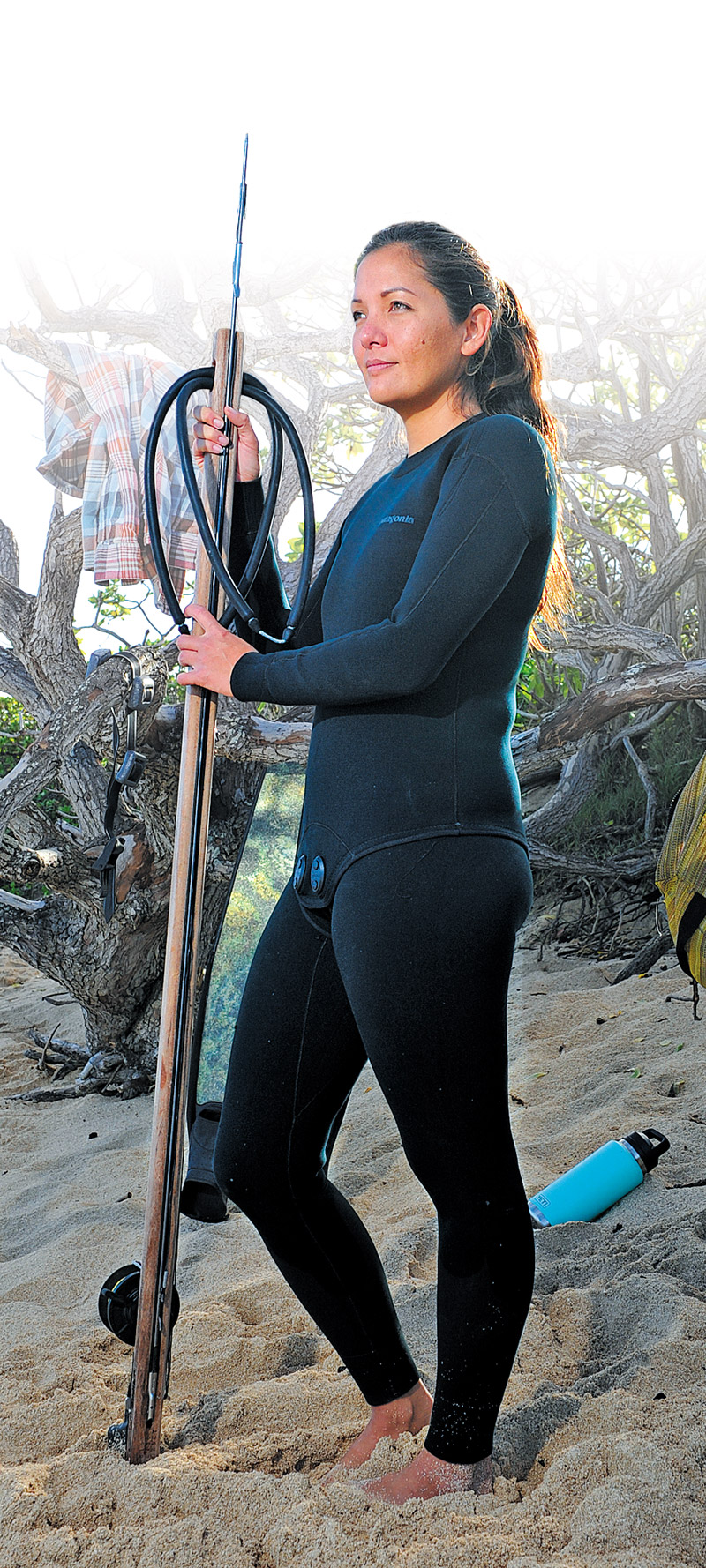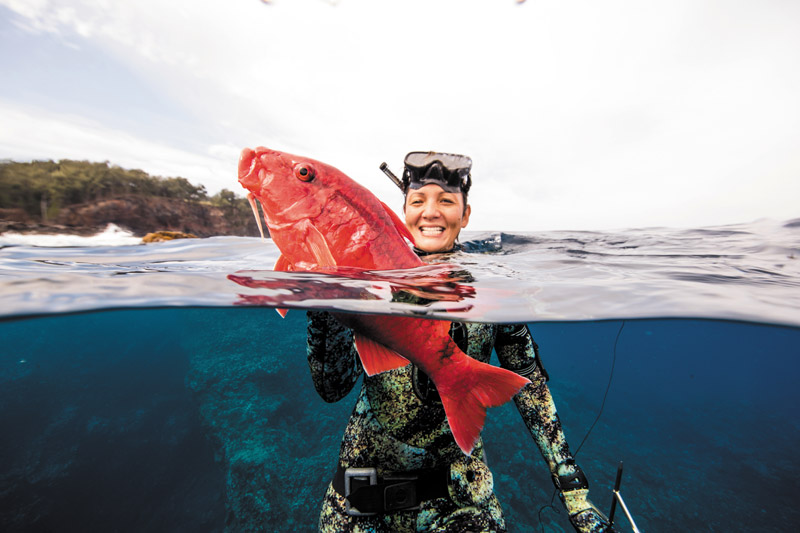Living Free With A Sea Huntress

World-class freediver Kimi Werner travels the globe as an environmental advocate, filmmaker and motivational speaker. But her journey to get here has been punctuated by setbacks and self-doubt. Only by learning to face the lows has Werner been able to reach heights she never before imagined.
One day far off the coast of Wai‘anae, Kimi Werner jumped from her kayak into the water for what she thought may be her last dive, at least for a while.
It was 2010, and Werner already was a hugely successful and widely known spearfisher who held national and international titles. Her ascension had seemed fated: Her first freediving experiences were with her father when she was just 5 years old. Later, she was mentored by some of Hawai‘i’s best spearfishermen, and within a few years, Werner was capturing championships.
So when she decided to withdraw from the competition circuit, it shocked a lot of people.
But for Werner, competition had lost its appeal. Worse, she felt like she was losing her passion for the sport. After walking away from competition, Werner explains, she got a lot of flak. She was called a waste of talent, a disappointment. Any time she got in the water, even just for fun, those words filled her head.
“I would go (spearfishing), and I would just feel like s***, basically,” Werner recalls. “Diving became quite unpleasant for me.”

Werner snares an octopus while diving in waters off the Azores. PHOTO COURTESY D.J. STRUNTZ/RIFFE
“The louder my mind got, the more it drowned out my instincts and all those things I need to hunt — and before I knew it, I was missing fish left and right, and I couldn’t hold my breath for as long … I saw myself doing worse, and then I really felt like a waste of talent and all of those things were just confirmed.”
All of her feelings of disappointment and frustration were at their peak that day in Wai‘anae. She had agreed to go spearfishing with some friends, but after a while, she’d had enough; it was no fun and she wanted to head back to shore. This could be it, she thought, so she’d take one more dive.
Werner had no way of knowing it then, but that day was something of a turning point. It didn’t happen right away, but over the following weeks and months, Werner not only renewed her love for the sport, but she also found new ways to utilize that passion.
Now, Werner travels the world raising awareness about environmental issues and the importance of knowing where your food comes from. She might have walked away from winning titles as a competitor, but she ended up creating all kinds of new titles for herself: environmental advocate, brand ambassador, content creator, filmmaker, motivational speaker.
“It’s been crazy,” Werner says, smiling. “I’ve gotten to see a lot of the world doing what I love while spreading a message of what I believe in when it comes to responsible hunting and sustainability and harmony within our ecosystem.”
But to get there, Werner first had to silence those voices in her head that told her what path she should be following. Doing that allowed her to pave her own way.

Werner gears up for a dive off Mokulē‘ia.
Staring into the void of not knowing what to do with her life after quitting competition must have been all the more frustrating for Werner because she’d already been there before. She had felt the same way a few years earlier, before she discovered spearfishing.
In her mid-20s, Werner was squarely on the path she had laid out for herself: After studying culinary arts at Kapi‘olani Community College, Werner was cooking in a couple different restaurants. But a post-college malaise began to creep in. The restaurant industry was unfulfilling; she didn’t feel connected to the frozen, imported food she worked with. Her days were monotonous.
“I think when you go to college, you always think this path is going to take you somewhere, and now it’s like OK, this is for the rest of my life,” she says.
As Werner asked herself what she wanted out of life, she was perplexed by the images that came to her: memories from her early childhood when she was diving with her dad.
It was so weird, she thought. How was that supposed to reflect her life’s purpose?
Growing up on Maui, Werner spent the early part of her childhood in a rural, isolated part of the island. Money was sparse, so her father often would spearfish to catch their dinner.
“He always jokes that he had two choices — one was hire a babysitter, or take me with him. And because he couldn’t afford the first one, that was kind of out.”
Back at home, she’d help her mom scale and cook the catch.
When both of her parents’ careers began to take off — her mom finished nursing school and got a job, while her dad launched his own plastering company — they moved from their shack to a subdivision, and traded catching their own food for trips to the grocery store.
Time went on, and those days retreated further into the depths of her memory.
Then, nearly 20 years later, some guys showed up to a barbecue with fish they’d caught.
“When I saw those fish hit the grill, something just snapped in me where I was like, ‘you need to do that; you need to figure out how to incorporate that back into your life.'”
From there, Werner had a one-track mind.
“I would see a truck that had a three-pronged (spear) sticking out of it … and I would go up to that person, total stranger: ‘Hi. My name is Kimi. Do you go diving? I really wish I could go diving. Maybe we could go diving together?'”
On what was supposed to be one of her first spearfishing sessions, her diving partner cancelled at the last minute. She decided to go anyway, alone. Walking across the beach, Werner was embarrassed; she remembers trying in vain to conceal her long spear as she passed the crowd.
“I felt like such an imposter,” she explains. “Every voice was going through my head —‘who do you think you are? You don’t know what you’re doing.'”
But when Werner stumbled upon a reef, she was greeted with a familiar sight: “I saw all the fish that I grew up eating. I saw these little mempachis peeking their heads out of the holes, and ‘āweoweo, and āholeholes.”
Emerging from the water that day with several tiny fish, Werner felt transformed.
“I held my head so high when I stepped onto that sand,” she recalls. “I honestly felt like this lioness who had just secured her kill. When I did go home and cleaned those fish with my own two hands and cooked them into a meal, that meal felt more satisfying than anything I had made in my culinary career.
“I knew it then — this is my life’s purpose, this is what I have been missing my whole life. This has always been it, and I found it again, and I am never going to let it go.”
What followed was a meteoric rise through the spearfishing world. Werner credits her mentors — champion spearfishermen Kalei Fernandez, Wayde Hayashi and Gavin Sato — with helping her build her skillset. But how does a relatively new spearfisher get the attention of such accomplished athletes?
“I stalked them,” Werner deadpans. Seeing them on TV, Werner was in awe of their natural movements in the water. So she started asking around if anybody happened to know them, and eventually someone did.
Initially, Fernandez wasn’t exactly enthusiastic about taking Werner diving — “I kinda was like, nah I don’t want to be responsible,” he admits — but after a few months of giving her pointers on land, they agreed to take her out.
While Fernandez remembers that Werner was obviously still a beginner at that time, she set herself apart with sheer tenacity.
“She kind of surprised me … She was telling me that she could only go 20 feet, and I made her dive 30,” Fernandez recalls of their first time diving together. “She did it, and I was like, ‘wow, this girl has got some potential.'”
Everyone told her it was quick, but just three years into her spearfishing career, Werner started entering — and winning — national and international contests.
Even now, Werner can’t help but smile when she thinks about her first national tournament. Held in Rhode Island, it marked her first time diving outside of Hawai‘i. The whole time, she was elated — she remembers singing as she paddled out — and when she took first place, “it was the best feeling ever.”
“It was something that will always be special to me,” she says. “But every tournament after that never quite felt the same. It just never did.”
A lot of people in the spearfishing community were upset when Werner stopped competing. She lost diving partners over it. She lost friends. Still, nobody could have been more distraught than Werner herself.
“I liked being the queen, I really did,” she admits. “I didn’t know who I was without those titles … I felt like the biggest loser in the world.”
But bouncing from competition to competition had morphed spearfishing into something she didn’t recognize.
Each event became just another win to check off the list. When she didn’t win, she felt horrible. Worst of all, even when diving for fun, she would auto-pilot into competition mode: “It was always about how many points would that fish be worth even when I wasn’t in the tournament.”
“After a while, I started realizing that I don’t like my happiness being based on being better than other people, or not being better than other people.”
Becoming an environmental advocate intent on saving the ocean, Werner admits, was a hugely ambitious, uncharted goal.
But she found that simply doing what she truly wanted to do — hunting in a responsible way — began to reel in all kinds of opportunities she never imagined. Pretty soon, people wanted to film and photograph her diving. Big brands like Yeti and Patagonia wanted to sponsor her.
Brand ambassadors at Patagonia, explains the company’s communications coordinator Corey Simpson, are not only top athletes, but have demonstrated dedication to environmental activism.
“(It) is really important to us for people to think about how they get their food, how they are connected to their food, and Kimi just embodies all of that,” Simpson explains.
“What Kimi does is something that is really wonderful … she brings so many of those amazing practices to a lot of people.”
The last couple of years have been a flurry of nonstop travel for Werner; sometimes she returns home long enough just to unpack and then re-pack. On each of her trips, she shares stories of places she sees and people she meets through films, blog posts and social media (she’s got more than 150,000 followers on Instagram).
Much of her advocacy relates to hunting — emphasizing the connection between the fish in the ocean and the fish on our plates; sharing recipes that utilize the entire fish to minimize waste; and highlighting lesser-known fish species to alleviate pressure on global fish stocks. Her work extends to other environmental issues, too. She once was on a weeks-long trip researching microplastics. Another trip brought her to Robinson Crusoe Island, where she taught the local community how to freedive as a way to help reintroduce them to the ocean after a devastating tsunami. In 2016, Werner even starred in her very own National Geographic show, Living Free with Kimi Werner, where she went around the world from Australia to Malaysia to Norway, documenting people who choose to live off the grid.
When she first started out on this new iteration of her career, she admits that not everyone saw things from her perspective — what was a huntress doing talking about conservation? But for Werner, that’s what it’s always been about.
“That initial soul connection I made to this lifestyle was all about having this harmonious relationship with nature and taking care of nature as it took care of me.”
Werner drew international attention a few years ago for the short film Variables, which features footage of her freediving in waters off Mexico — and hitching a ride on the fin of a great white shark.
Over the years, Werner had experimented with how to best respond to sharks, reading their body language and approaching them when they seemed nonthreatening.
Still, she admits, “Trust me, there is nothing scarier than watching the head of a great white shark coming up toward you.”
But Werner didn’t try to run away — instead, she swam right toward the shark.
“And that is what we did,” Werner recalls. “She would come up and I would be like, ‘oh no,’ but I would hold my ground and go down to meet her halfway, and every time I did, she would veer off. It got to the point where we were passing each other by, just these two predators rubbing elbows, checking things out.”
Then, one time as the shark came back toward Werner, it suddenly stopped.
“I am about to pretty much run into this shark and I have two choices: One, I can flip around and kick back toward the surface. That doesn’t sound good,” Werner says, miming a shark chomping its teeth. “Or two, I better make it smooth. So I reach my hand out, let her know I’m there, and we went for that wonderful ride.”
Perhaps it’s this moment more than anything that really illustrates what it’s like to be Kimi Werner: to take a challenge head on — even if you’re afraid, even if it seems insane, and even if you have no idea what’s going to happen next — and turn it into a beautiful, improbable dance.
To keep up with Kimi Werner’s adventures, visit kimiwerner.com or follow her on Instagram @kimi_swimmy.






